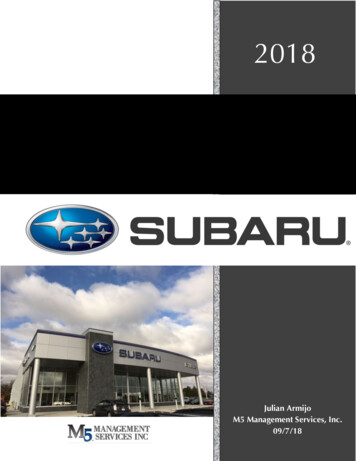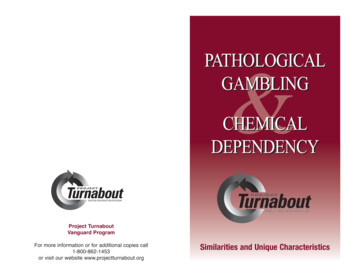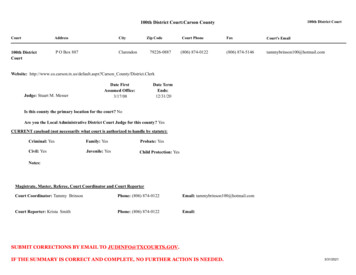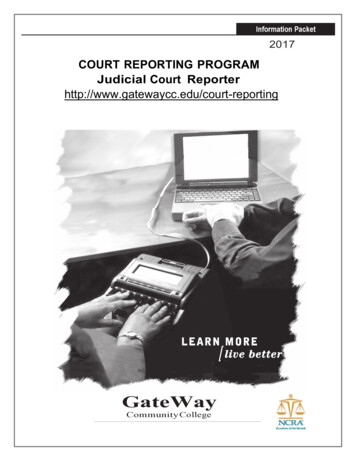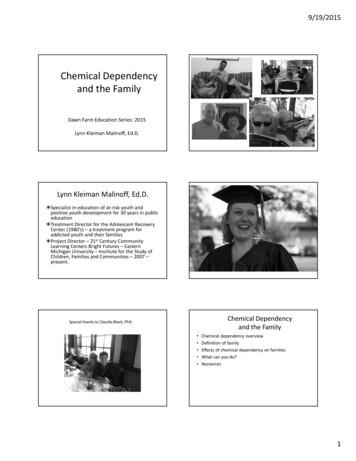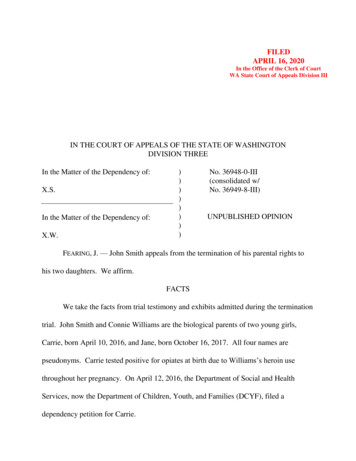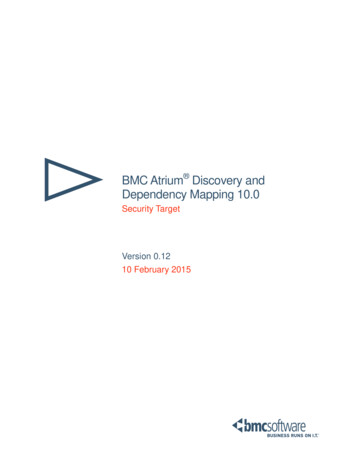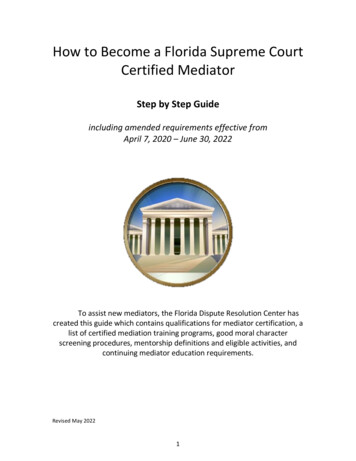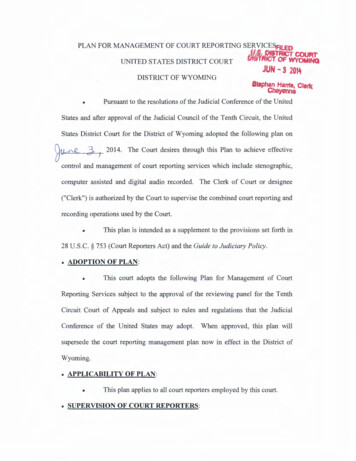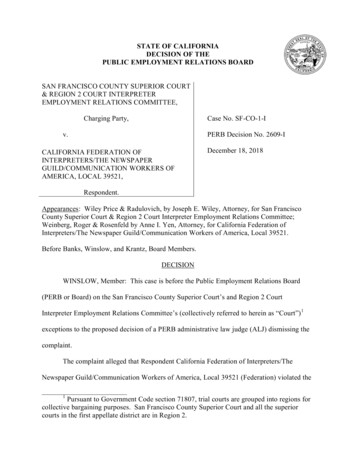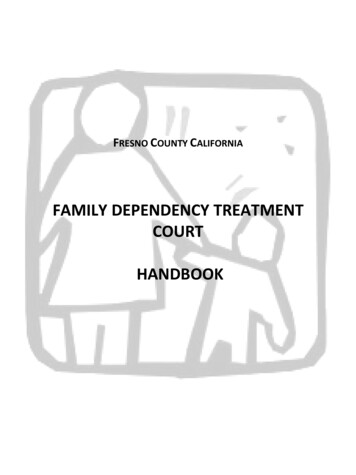
Transcription
FRESNO COUNTY CALIFORNIAFAMILY DEPENDENCY TREATMENTCOURTHANDBOOK0
Welcome to the Family Dependency Treatment Court!The Family Dependency Treatment Court (FDTC) is a special program designed to help youand your children get back together or stay together. To reach that goal, this program willhelp you recover from substance abuse by referring you to a substance abuse treatmentprogram and monitoring your progress there. This program will also help to make sure thatwhile you are in treatment you stay in contact with your children and plan for their future.We hope that by working together, we can help you break the cycle of addiction and build abetter life for yourself and your children.To reunify your family, this program requires that you complete substance abuse treatmentas well as other requirements set forth by the court.As you work through treatment at a community-based treatment program, you will alsoprogress through levels of participation at the court. Each level has specific requirements foradvancement. The court and your Family Dependency Treatment Court Case Manager willconstantly monitor your progress and help you reach those requirements. Each graduationfrom a level will be celebrated. Your biggest success will be to make a safe and happy homefor your children.1
GOALS/MISSIONRecognizing that a majority of the cases appearing in dependency court involve drug use, it isthe mission of the FDTC to assist parents in addressing their substance abuse issues in orderto increase the chances of reunification with their children. To that end, the FDTC willformulate and implement a treatment plan to assist in recovery, conduct reviews of theparents’ progress, and liaise with other programs to exchange information and coordinateservices. Additionally, the FDTC will maintain data relating to the progress made by itsparticipants in order to assess its success.MISSION:To Support, Stabilize and Reunify families through Treatment!VALUE STATEMENT: We value and encourage FOCUS FamilyOpportunityCommunityUnificationSobriety2
The Family Dependency Treatment Court TeamThe FDTC team will make all decisions regarding your participation in this program. Theteam consists of the: Drug Court JudgeDrug Court StaffParent’s AttorneyDrug Court AdvocatesTreatment ProvidersSocial Workers3
4
Expectations and Support You will be referred to the Drug Treatment Court Coordinator to assess your needs andhelp you as you go through the Court process. You will gain support from the Judge, Treatment Court Coordinator, treatment courtteam, Social Workers and other community providers. You will quickly be linked to an appropriate addiction treatment program, parentingskills workshops, and any other services you need. You will get ongoing support and assistance in staying connected to your children whilethey are placed out of the home. As you establish sobriety and become more stable in treatment, the Judge may considerincreased visitation with your children. You will get ongoing support if you have problems getting or staying clean. You can participate in groups with other parents going through the same things you aregoing through. You will not be alone as you regain your children and learn a new way to live clean andsober.Chemical (Drug) TestingYou will be randomly drug tested throughout your participation in the FamilyDependency Drug Court program. You will be observed to ensure freedom from errors. If you miss a test, it will count as a positive (dirty) test. If you have a positive test, the Judge, based on recommendations from the drugcourt team, will discuss your continued participation in the program. Any diluted test will be considered a positive test. All test results are final.ConfidentialityYou will be asked to sign a waiver of confidentiality statement. You must agreethat everything you see and hear in court is open to the public.5
Admission CriteriaThe following criteria will be used by the drug court treatment team to determine if you areappropriate for referral to the Family Dependency Treatment Court program.1. You have been diagnosed with a substance abuse or chemical dependency diagnosis andyou are clinically appropriate for admission and you are amenable to treatment.2. You must agree to sign the program participation agreement form and abide by theconditions set therein.3. You must be willing to cooperate with the recovery plan and all court-ordered services.These could include, but are not limited to: substance abuse/addiction treatment,parenting skills, and health care for yourself and your family members.4. You must not be involved in any methadone treatment.5. You must be willing to abstain from drugs and alcohol and be willing to submit toregular and random urinalysis monitoring.6. You must be willing to consider a restraining order and observe the terms of thisrestraining order if a member of the household commits or has committed domesticviolence against any family member.7. You must have at least 1 child under the age of 5.8. You must be over the age of 18.9. You must be willing to be completely honest in all communication with the court,drug treatment team and Social Workers.10. You must be accepted by the Family Dependency Treatment Court team.6
FAMILY DEPENDENCY TREATMENT COURT PROGRAM RULESAs a Family Dependency Treatment Court participant, you will be required to abide by thefollowing rules 1. Obey all court orders.2. Attend all ordered drug treatment sessions. This includes residential, outpatient, soberliving, individual and group counseling, educational sessions, drug testing, and self-helpmeetings.3. Be on time. If you are late to any of the programs, you may not be allowed to attendand will be considered to be out of compliance with your treatment plan. This alsoincludes any appointment for urinalysis testing. If you miss a urinalysis appointment, itwill count as a positive test result.4. Do not disrupt treatment, make threats or behave in a violent manner toward anyone,including staff and other participants! Violent or inappropriate behavior will not betolerated and will be reported to the court. This may result in immediate terminationfrom the Family Dependency Treatment Court program.5. Do not bring drugs, alcohol or weapons into any treatment program, meeting,appointment or event.6. Dress appropriately for court and treatment sessions. As a participant, you will beexpected to wear a shirt or blouse, pants, dress, skirt or shorts of a reasonable length.Shoes must be worn at all times. If you have difficulty with this, please inform the staffand assistance will be provided. Clothing bearing gang-, drug- or alcohol-relatedlanguage is considered inappropriate!7. Appropriate behavior during court proceedings is mandatory. Any disruption duringcourt will be viewed as disrespectful toward the court and its participants.7
Levels of Family Dependency Treatment Court ParticipationOne of the goals of the Family Dependency Treatment Court is to get you into a treatmentprogram and help you to stay in treatment until you complete it.To help you focus on meeting the requirements for graduation, you will pass through four levelsor phases of Family Dependency Treatment Court. The following questions and answersexplain the Levels.What is a level/phase?A level/phase is a stage of participation in the Family Dependency Treatment Court. There arefour levels of participation:Level I:Level II:Level III:Aftercare:ChoiceChallengeChangeMaintainWhy are there four levels?Recovery from substance abuse is a long process. Sometimes, setting short-term goals can helpyou feel less overwhelmed. Breaking down the specific requirements for graduation and/orreunification can also help you to stay focused on your successes.How will I move through the levels?Each level has a set of requirements. Once all the requirements for each level have been met,you will be eligible to advance to the next level. Each time you advance to the next level, youwill receive a reward for “phasing up” to the next level.How long will it take to complete all of the Levels?It will take from six (6) to twelve (12) months to complete all requirements.What happens if I fail to complete all the Levels?It will be up the Family Dependency Treatment Court Judge to determine any consequence orsanction. At any time, the Judge can discharge you from the FDTC program.8
Level 1: ChoiceThe main focus of this Level is to encourage your CHOICE to work toward a drug-free life andestablish a foundation for abstinence.Goals for this Level include: Detoxification and abstinence. Placement in community-based treatment. Evaluation for additional special needs or services. Identification of community supports. Goal setting for parenting skills development. Goal setting for education, employment, life skills, and independent living. Improved interaction with children.Requirements for Advancement from Level I: Participation in a community-based drug and alcohol program as referred by theTreatment Court Coordinator. Maintain a positive treatment center report. Consistently attend a minimum of two self-help/12-step meetings per weekand submit weekly signed attendance logs. Engage in satisfactory supervised visits (if children are in out-of-house placement). Attend all parenting classes and other required treatment. Meet with a Social Worker weekly to discuss needs and progress. Attend the FDTC bi-weekly. Have a minimum of 30-45 days of continuous sobriety along with programcompliance to advance to Level II.9
LEVEL II: CHALLENGEThe focus of this level is to stabilize you in treatment, CHALLENGE you to confront underlyingissues surrounding your addiction and its impact on your family and, help you rise to thechallenge of recovery as a way of life.Goals for the second Level include: Continued abstinence and development of recovery tools. Significant progress toward attaining treatment goals established by your treatmentprogram. Continued and improved interaction with family and children. Participation and progress toward goal achievement in educational, vocational, andlife skills plans. Identification of additional needs and linkage to services. Development of sound parenting practices and strategies.Requirements for Advancement from Level II - (In addition to Level I requirements) Continued attendance at a minimum of two self-help/12-step meetings a week (submitsigned, weekly meeting logs).Join a self-help/12-step home group.Obtain a sponsor.Attend a 12-step study group.Attend drug court bi-weekly.Attend any parenting or other recommended treatment services.Completion of treatment program Phase 1.Have 90-120 days clean and sober along with treatment compliance to advance toPhase III.10
LEVEL III: CHANGEThe focus of this level is to promote continued CHANGE within you toward self-sufficiencywhile reconnecting with the community-at-large.Goals for the third level include:o Internalization of recovery tools.o Continued development of daily coping and parenting skills.o Stable living and financial arrangements.o Reintegration into family and community.o Preparation, in all respects, for reunification and continued drug-free living andparenting.Requirements for Level III - (In addition to Level I and II requirements) Acquisition of sufficient housing.Meet with Social Worker during off court weeks for sessions with caseworker.Sustained cooperation with visitations.Sufficient progress in service plan requirements.Attend a minimum of two, self-help/12-step meetings a week.Attend drug court as ordered.Submit signed meeting attendance logs.Begin working the 12 steps with a sponsor.Attend any parenting or other recommended treatment services.Begin working to obtain employment and/or sufficient financial support.Have 150 days clean and sober to advance to aftercare.11
LEVEL IV: MAINTAIN (AFTERCARE)The focus of this level is to promote and MAINTAIN long-term abstinence and become aresponsible, productive member of your community.Goals for the aftercare level include: Reduce personal and family isolation and increase family and community supportsystems. Maintain recovery and drug-free lifestyle. Engage in activities that build harmony, support, and unity among family members. Gain confidence, expertise, and effectiveness in the ability to manage discipline issuesresulting from the early lack of attachment and bonding. Become actively involved in each child’s interests, aptitudes, and abilities and exploretheir possible linkage to future careers and lifestyles.Requirements for the aftercare level - (In addition to levels I, II, and III requirements) Maintain sobriety. Maintain sufficient housing. Attend one to two self-help/12 Step meetings per week. Maintain a sober support system. Maintain weekly contact with FDTC Coordinator and Social Worker. Attend scheduled review hearings when applicable.12
Swifter Court Process: Disposition and Permanency HearingsOnce you have made an admission and agreed to participate in the Family DependencyTreatment Court, you have taken the first step toward making faster progress with your DSScase plan.The HearingsAfter your enrollment in the FDTC program, the Judge will enter a court order thatdetermines what treatment services and conditions you must meet to regain custody. Youwill also be placed on the Family Dependency Treatment Court calendar for regularhearings. These orders stay in effect for periods of up to 12 months.What happens after this court order is entered?Once an order is entered, the court and treatment team will continue to monitor your case.You must continue to abide by all court orders and expectations. As your case progresses,frequent court appearances will allow the court to make changes in your treatment andservice plan, like new referrals or changes in visitation. You must comply with any changesin orders that the court makes.What happens if, after the court order, I fail to comply with Family DependencyTreatment Court?If you don’t make progress in treatment following the court order or fail to follow the rules,the Judge may impose therapeutic sanctions. If you still fail, the drug court treatment teamwill look at your needs and reassess your case plan. This means that you will still have tocomply with all court orders around achieving sobriety and becoming a safe and soberparent. If you continue to be non-compliant, your case will proceed to the next step, apermanency hearing, where the goal for your child may be changed to adoption,guardianship or the Judge may consider continued family reunification services.What is a Permanency Hearing?A Permanency Hearing is a formal hearing where a permanency planning goal for your childis determined. There are several possible plans for every child placed out of the home: Return the child to the parent. Place the child for adoption by terminating parental rights. Permanently place the child in the guardianship or custody of a fit and willingrelative, or another permanent arrangement if the other plans are not realistic orpossible.The majority of children placed out of the home for the first time will have a permanencyplan of “return to parents.” At a permanency hearing, which occurs about 12 months aftera child has been placed out of the home or after an abuse or neglect finding has been made,the original goal will be reassessed and may be changed. Any change in the goal will bebased on your progress both in treatment as well as in planning for your children.13
Why would a permanency planning goal be changed?If you haven’t complied with treatment and all the court orders in your case, the court candecide that returning your child to you is no longer a viable plan. At that point, the goalmay be changed to adoption and termination of parental rights may be initiated.14
Encouraging AchievementsWhat is a reward or incentive?Compliance with drug court rules will result in rewards called “incentives.” This is anacknowledgment by the court that you have reached a treatment milestone or accomplished aspecific achievement. Failure to comply with rules may result in a delay with incentives andprogression throughout the program.Rewards can be as simple as applause in the courtroom and fewer court reviews, gifts, toys,books and more.Why are rewards given?It is important to acknowledge achievements and progress in some tangible way. Receivingrewards can build self-esteem and help you set the stage for continued progress.Are the rewards the same for everyone?There are several possible rewards that can be granted for each particular achievement ormilestone. Since every case is a little bit different, the Judge decides which reward is mostappropriate for each case. In some situations, the judge may grant more than one reward.Also, all rewards are subject to the rules of the treatment program in which you are enrolled.Are visits with my children rewards?If you are doing well, you will be a better parent and will be able to see your children more. Butcontacts and visits with your children will not be used against you.ANY INCREASE OR DECREASE IN VISITATION MUST FIRST BE BASED ON THE BEST INTEREST OFTHE CHILD.Increased visitation will be dependent upon:1. Availability of appropriate family members or others in the supportnetwork to supervise the extra visit.2. Availability of agency resources (staff) to supervise the extra visits.The Judge has the ultimate discretion in deciding which rewards are appropriate for eachachievement or milestone.15
Responding to ProblemsRecovery Interventions and Therapeutic SanctionsJust as it is important to recognize progress, it is also important to respond quickly to problemsor shortfalls you may have in treatment participation. By imposing recovery interventions andor therapeutic sanctions on you if you do not comply with treatment, the court hopes to helpyou learn that there will be swift consequences for your actions. The objectives, however, arenot only to remind you that you need to comply fully, but to help you stay engaged intreatment and encourage you to continue working through the recovery process.What is an infraction?An infraction is a negative behavior or action that is contrary to the treatment process. At theFamily Dependency Treatment Court, infractions are divided into three groups, based onseriousness. “A” infractions are very serious, “B” infractions are considered moderately seriousand “C” infractions are less serious. Some infractions are positive toxicology tests, missedappointments, or breaking rules at the program.What is a recovery intervention?A recovery intervention is a response to an infraction. The seriousness of the infractiondetermines the severity of the Intervention imposed. Interventions are graduated. Not only aremore severe interventions imposed for more serious infractions, but also as infractionsaccumulate, the interventions become harsher.How many infractions and interventions can I get before being terminated from the FamilyDependency Treatment Court? This is on an individual basis. There is some room forbehavioral mistakes and adjustments; however, you will not get unlimited chances to changeyour behavior and succeed in treatment. When you run out of chances, you risk losing yourparental rights.ANY INCREASE OR DECREASE IN VISITATION MUST FIRST BE BASED ON THE BEST INTEREST OFTHE CHILD (and may be implemented at other times, not just as a sanction). The Judge hasthe final decision about sanctions given.16
Family Dependency Treatment Court Failure,Goal Changes and Termination of Parental RightsThough the Family Dependency Treatment Court and the Department of Social Services (DSS)help every participating family in achieving reunification or successful completion, they alsohave an obligation to seek permanent homes for children in a timely fashion. In every childprotective case, a permanency planning goal for the child will be set early in the process. Forvirtually all FDTC clients, that goal will be to return the child to the parent; however, if you donot comply with the drug court program and the court order within the mandated period oftime, the court and DSS may decide to change the permanency planning goal to free the childfor adoption.When will a case be considered a Family Dependency Treatment Court “failure”?After a child has been placed out of the home for about 12 months, the court will hold apermanency hearing. If you have failed to cooperate with treatment and the FamilyDependency Treatment Court and/or court order, and have used up all opportunities offered,the permanency plan for the children may be changed from return to you, to an alternativeplan, perhaps, termination of parental rights and adoption. The case may be terminated fromFamily Dependency Treatment Court and returned to the original judge for new consideration.What is termination of parental rights?When your parental rights are terminated, you lose all legal responsibilities and rights regardingthe child. Once parental rights have been terminated, the child can be adopted by someoneelse.17
Putting It All Together:Graduation and Successful Completion of theFamily Dependency Treatment CourtWhat is graduation?Once you have completed all levels of the Family Dependency Treatment Court and havecomplied with the disposition order, you will be ready for graduation.What happens after graduation?Once you graduate from Family Dependency Treatment Court, your case will be returned to theregular court review calendar and, depending on the recommendation of your Social Worker,may be closed shortly thereafter.What are the requirements for graduation?The following requirements are necessary for a participant to be eligible for graduation: Implementation of a permanency plan that is acceptable to the court.Sustained cooperation with all terms and orders during the dispositional period.Sufficient satisfactory, unsupervised visitations and/or sustained cooperation withsupervision during any trial return period.Completion of a substance abuse treatment program as referred by the court.Satisfactory completion of a comprehensive parenting skills program.Acquisition of adequate housing for the family.Submission of a graduation application.18
CONCLUSIONThe Family Dependency Treatment Court program has been developed to help you become abetter parent and to live a clean and sober lifestyle. The program is designed to give you everychance to get your family back together and join the community as a productive andresponsible person. The program is voluntary and is your personal choice. The Judge and thetreatment team are here to assist and guide you, but the final responsibility is yours. We careabout our participants, but you are the one who has to make it!If you have any additional questions or concerns about this special court program, talk to us!Important Family Dependency Treatment Court program phone numbers will be given to you.Finally, do not forget your family and those who are close to you! Make them a part of whatyou are trying to accomplish and let them share in your success.Last revised: 12/5/1319
PROGRAM FORMS:20
SUPERIOR COURT OF CALIFORNIA COUNTY OF FRESNOFamily Dependency Treatment Court AgreementCase Number:Name of Client:Date:I,, acknowledge that a substance abuse problem is affecting theways in which I parent my child or children. I request entry into the Family Dependency TreatmentCourt (FDTC). I understand that if I am accepted into the FDTC, I must follow the rules of FDTC.I further understand that if I am successful in completing all the requirements of FDTC it will notguarantee that my child/children will be returned to my care, or my case dismissed, but it will be asignificant factor for the Court to consider when making decisions.I understand that if I am unsuccessful in FDTC, as determined by the Court, or if I stop participating inFDTC, I may be discharged from FDTC but would still be responsible for participating in the case planordered in the juvenile dependency case.I acknowledge the following: I have been provided a copy of the FDTC Participant Handbook. I fully understand what participation in FDTC means. I have reviewed all the requirements contained in the FDTC Participant Handbook with myattorney I will fulfill all requirements of FDTC to the best of my ability.PARENT:Date:PARENT’S ATTORNEY:Date:APPROVED:Date:21
SUPERIOR COURT OF CALIFORNIA COUNTY OF FRESNOFamily Dependency Treatment CourtAcknowledgements and AgreementsParent ParticipationMinor’s Name:Case Number(s):Parent:1. I have discussed Family Dependency Treatment Court (FDTC) with my attorney and I agree to participatein FDTC.2. I understand that during FDTC staffing meetings and FDTC review hearings, the judge may receiveinformation about the child or children, and will receive information about me, and my participation andprogress in court-ordered treatment programs.3. I understand that no court orders will be made or changed at FDTC staffing meetings or FDTC reviewhearings.4. I understand and agree that FDTC staffing meetings and FDTC review hearings will not be recorded by acourt reporter and no transcripts of these meetings and hearings will be prepared.5. I understand that the FDTC judge will not discuss what occurs at FDTC staffing meetings and FDTC reviewhearings with any FDTC judge handling a non-FDTC legal hearing in the case.6. I understand that other FDTC participants who are not parties to the case may be present during FDTCreviews but that I may request that no other FDTC participant be present at my FDTC review hearing.7. I understand that I can revoke these agreements at any time.After consulting with my attorney about Family Dependency Treatment Court, I am making the aboveacknowledgements and agreements freely and voluntarily.DATED:By:(SIGNATURE OF PARENT)(PRINT NAME)Declaration of Parent’s AttorneyI,, spoke with my client regardingAcknowledgements and Agreements. I thoroughly reviewed them with my client. My client appeared tounderstand them and agreed to all of their terms. I am signing this form on her/his behalf until the client cansign it personally.I declare under penalty of perjury, under the laws of California, that the foregoing is true andcorrect.DATED:By:(ATTORNEY FOR PARENT)22
SUPERIOR COURT OF CALIFORNIA COUNTY OF FRESNOFamily Dependency Treatment CourtAcknowledgements and AgreementsOther Parent ParticipatingMinor’s Name:Parent:1.2.3.4.5.6.7.8.9.10.11.12.13.14.I have discussed Family Dependency Treatment Court (FDTC) with my attorney.I understand that another parent who is a party in the case is eligible to participate or is participating in FDTC.I have discussed the other parent’s participation in FDTC with my attorney.I understand that during FDTC staffing meetings and FDTC review hearings, the judge may receive information aboutthe child or children, and will receive information about me, and my participation and progress in court-orderedtreatment programs.I understand that during the other parent’s FDTC review hearings, the judge may deliver to that parentencouragement and incentive items to assist and motivate that parent in completing his or her case plan.I understand that at the other parent’s FDTC staffing meetings and FDTC review hearings there may be some limiteddiscussion of me, and my participation and progress in any court-ordered treatment programs.I understand that no court orders will be made or changed at the other parent’s FDTC staffing meetings or FDTCreview hearings.I understand that the FDTC judge will not discuss what occurs at FDTC staffing meetings and FDTC review hearingswith any judge handling a non-FDTC legal hearing in the case.I understand and agree that FDTC staffing meetings and FDTC review hearings for the other parent will not berecorded by a court reporter and no transcripts of these meetings and hearings will be prepared.I agree that I do not need to be personally notified of the other parent’s FDTC staffing meetings and FDTC reviewhearings.I understand that my attorney may attend the other parent’s FDTC staffing meetings and FDTC review hearings.I agree not to be personally present at the other parent’s FDTC review hearings.I understand that other FDTC participants who are not parties to the case may be present during FDTC reviews.I understand that I can revoke these agreements at any time.After consulting with my attorney about Family Dependency Treatment Court, I am making the above acknowledgementsand agreements freely and voluntarily.DATED:By:(SIGNATURE OF PARENT)(PRINT NAME)Declaration of Parent’s AttorneyI,, spoke with my client regardingAcknowledgements and Agreements. I thoroughly reviewed them with my client. My client appeared to understandthem and agreed to all of their terms. I am signing this form on her/his behalf until the client can sign it personally.I declare under penalty of perjury, under the laws of California, that the foregoing is true and correct.DATED:By:(ATTORNEY FOR PARENT)23
SUPERIOR COURT OF CALIFORNIA COUNTY OF FRESNOFamily Dependency Treatment CourtAcknowledgements and Agreements(DSS)Minor’s Name:Case Number(s):1.The Department of Social Services (DSS) and the Office of the County Counsel areaware of the policies and practices of the Family Dependency Treatment Court(FDTC).2.DSS understands that one or more parents who are parties in this case are eligible toparticipate or are participating in FDTC.3.DSS understands that all parents who are parties may not be present or represented atindividual FDTC staffing meetings or individual FDTC review hearings.4.DSS understands that during each FDTC staffing meeting and FDTC review hearing, thejudge may receive information about the child or children, and will receive informationabout one or more parents, and a parent’s participation and progress in court-orderedtreatment programs.5.DSS understand
Chemical (Drug) Testing You will be randomly drug tested throughout your participation in the Family Dependency Drug Court program. You will be observed to ensure freedom from errors. If you miss a test, it will count as a positive (dirty) test. If you have a positive test, the Judge, based on recommendations from the drug
